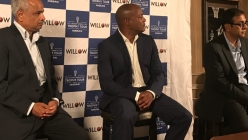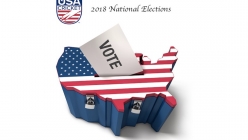An Open Letter to Don Lockerbie, CEO of USA Cricket
2010 Nov 14 by DreamCricket USA
The fact remains; these are all means to an end, and that end is: are Americans taking up the game, are they, in any way, raising cricket up from being an "underground" sport?
Now, you can get all the USA Cricket updates via Facebook. Also follow us on Twitter via @dreamcricket
______________________________________________________________________________
From: Tom Melville, Author and Sports Historian
To: Don Lockerbie, CEO of USA Cricket
Don,
Know what you’re up against, and that there are three facets of any given culture that are incredibly difficult to change: (1) its language, (2) its religion, and (3) its sports.
For anyone to claim “I’m going to turn America into a cricket playing country” is tantamount to claiming, “I’m going to turn America into a Spanish speaking country; I’m going to turn America into a Muslim country.” A pretty tough row to hoe! Expectations must be brutally realistic; efforts must be highly imaginative; planning must be exceptionally creative.
Know that America is not a “cricket culture,” it’s a culture that does not know, does not care about, and, in many ways, is hostile towards cricket. No matter how much experience, no matter how much “expertise” anyone may have accumulated in a cricket culture, he will soon discover they’re virtually worthless here, and can never be a substitute for hands-on, face-to-face, experience working with Americans at cricket.
Know that, like any other business enterprise, you’re bringing a product to market and that you’re bringing the most culturally sensitive product (sports) to a foreign market. Know this market well. What do Americans think about cricket? What do they like about it? What do they dislike? How can we modify this “product” to make it acceptable to this market? Exceptional efforts must be made to bring cricket to Americans. Americans will never come to cricket.
Know that there isn’t anyone who’s going to put you under any obligation to bring cricket to Americans. Not the ICC, not the immigrant community, and certainly no Americans are complaining that no one’s bringing cricket to them!
Only one thing will oblige you to do this: your own moral responsibility, which should say: this is America and we can no more truthfully speak of “American cricket” without Americans than we can speak of “Indian cricket” without Indians or “West Indian cricket” without West Indians.
Know that you can send the national teams to as many tournaments as you can find; that you can stage as many first class matches in this country as you can arrange; that you can build as many cricket stadia in this country as you can get. The fact remains; these are all means to an end, and that end is: are Americans taking up the game, are they, in any way, raising cricket up from being an “underground” sport? If any of these can demonstrably show they are contributing to this end they must be supported and encouraged. If they are not their continuation must be seriously questioned.
Look to Canada. Their national team has been to the World Cup three straight times but it hasn’t raised the game’s profile in that country one iota. With the Sahara Cup first class cricket was before the Canadian public for years yet they ignored it. The road the Canadians have taken with their cricket is a dead end and the United States must not blindly go down this same path.
Know history, and this history says the cricket world has been trying to get Americans to take up cricket for over a hundred fifty years, over which time just about every idea, scheme, and angle has been tried with little success. Anyone who takes up this age old cause must look deep, deep, within, put aside enthusiasm, avoid presumptions, and coldly ask themselves: “What, exactly, will I be doing that’s different from everything that’s been done in the past?”
Best wishes,
Tom Melville
[Opinions expressed here are those of the author. Tom Melville is a member of the rare species of American-born cricketers and a historian and researcher. He is the author of The Tented Field: A History of Cricket in America (Bowling Green State University Press) and Early Baseball and the Rise of the National League (McFarland & Company).]




